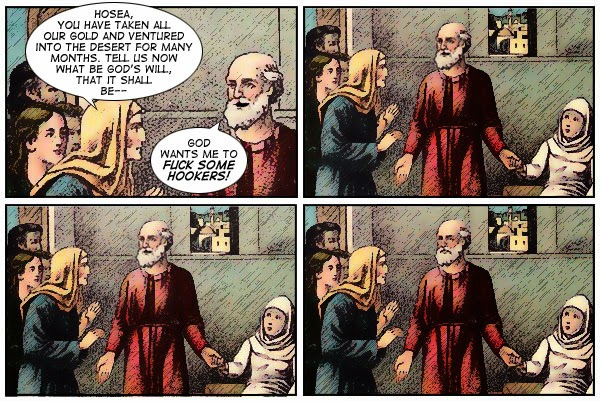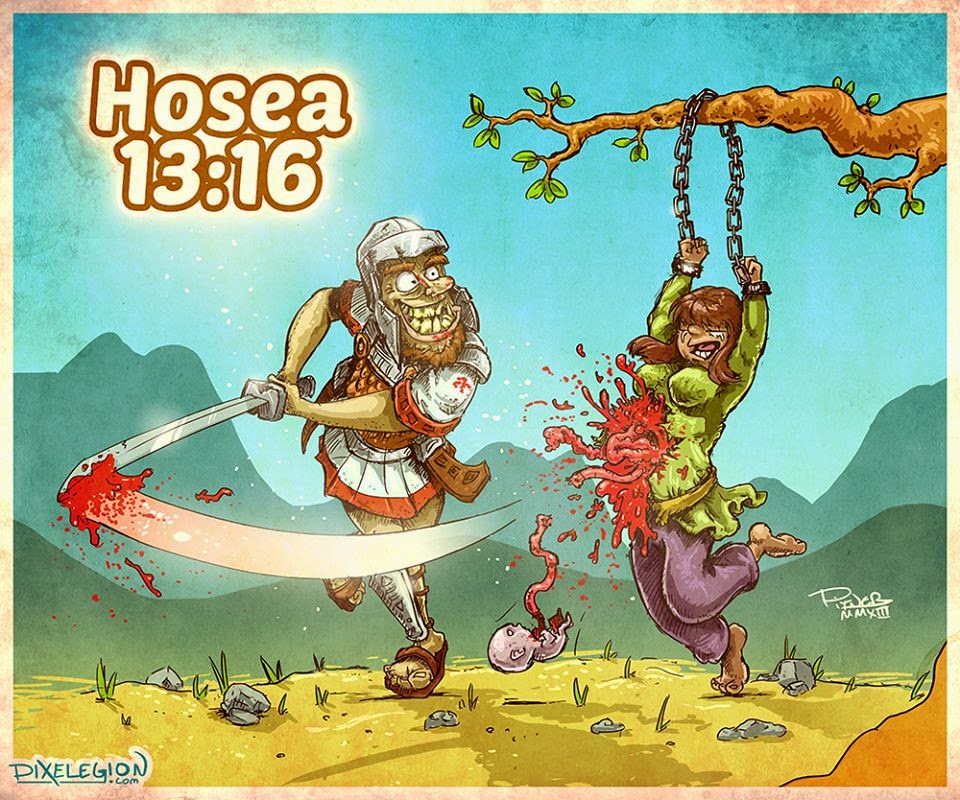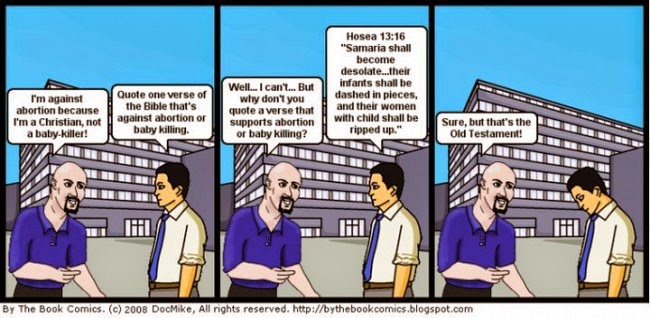“I Will Betroth Thee unto Me in Righteousness”
Hosea 1–3; 11; 13–14
LDS manual: here
Reading
This chapter is about Hosea. We’ve seen some unusual behaviour from prophets — genocide, hacking oxen to pieces, bear maulings — but this is one of the stranger ones. To hear Hosea’s side of the story, Jehovah / Jesus commanded him to take a wife that would be adulterous. Her name was Gomer. A popular name, apparently.
1:2 The beginning of the word of the LORD by Hosea. And the LORD said to Hosea, Go, take unto thee a wife of whoredoms and children of whoredoms: for the land hath committed great whoredom, departing from the LORD.
1:3 So he went and took Gomer the daughter of Diblaim; which conceived, and bare him a son.
I have to say something here. In the beginning, God created the heavens and the earth. But in this book, plus Job and Jonah recently, we now see that God’s going through a phase where he’s just dicking with people.
Anyway, having married an adulterous wife, Hosea writes an entire book of the Bible excoriating her for having lovers, threatening Israel with death and destruction, and asking the Lord to exact a series of frighteningly specific punishments on his wife and Israel alike.
The picture I’m getting here is that Hosea’s wife had an affair, and he handled it monumentally badly.
Presently, Hosea’s wife has children, and Hosea gives creative names to these adorable tots:
- a baby son Jezreel, so named because God was going to kill lots of people to avenge the killings of Jezreel. Charming!
- a baby daughter Loruhamah, which means ‘unloved’. What a cutie!
- a baby son, Loammi, which means ‘not my people’. Aw, he’s adorable.
Apart from the psychological damage inflicted by these names, the main problem is that it’s just impossible to find personalised baby stuff for them.
Then Hosea tells his kids that their mom is a whore, and that he’s not her husband.
2:2 Plead with your mother, plead: for she is not my wife, neither am I her husband: let her therefore put away her whoredoms out of her sight, and her adulteries from between her breasts;
2:3 Lest I strip her naked, and set her as in the day that she was born, and make her as a wilderness, and set her like a dry land, and slay her with thirst.
I hate when people bring the kids into it.
And, in an extra twisted touch, he’s not going to be merciful to them because they are — as they say — brothel sprouts.
2:4 And I will not have mercy upon her children; for they be the children of whoredoms.
Way to go, Dad. Ironically, this lesson is being taught on Father’s Day all over Australia.
At this point, the text becomes a little unclear, but it appears from commentaries I’ve read that Hosea goes and buys his wife back from someone. In other words, she’s become a prostitute.
3:1 Then said the LORD unto me, Go yet, love a woman beloved of her friend, yet an adulteress, according to the love of the LORD toward the children of Israel, who look to other gods, and love flagons of wine.
3:2 So I bought her to me for fifteen pieces of silver, and for an homer of barley, and an half homer of barley:
Read the following scriptures with the class. What does the Lord threaten to do to those who don’t worship him?
9:14 Give them, O LORD: what wilt thou give? give them a miscarrying womb and dry breasts.
9:15 All their wickedness is in Gilgal: for there hated them: for the wickedness of their doings I will drive them out of mine house, I will love them no more: all their princes are revolters.
9:16 Ephraim is smitten, their root is dried up, they shall bear no fruit: yea, though they bring forth, yet will I slay even the beloved fruit of their womb.
10:13 Ye have plowed wickedness, ye have reaped iniquity; ye have eaten the fruit of lies: because thou didst trust in thy way, in the multitude of thy mighty men.
10:14 Therefore shall a tumult arise among thy people, and all thy fortresses shall be spoiled, as Shalman spoiled Betharbel in the day of battle: the mother was dashed in pieces upon her children.
10:15 So shall Bethel do unto you because of your great wickedness: in a morning shall the king of Israel utterly be cut off.
13:7 Therefore I will be unto them as a lion: as a leopard by the way will I observe them:
13:8 I will meet them as a bear that is bereaved of her whelps, and will rend the caul of their heart, and there will I devour them like a lion: the wild beast shall tear them.
13:15 Though he be fruitful among his brethren, an east wind shall come, the wind of the LORD shall come up from the wilderness, and his spring shall become dry, and his fountain shall be dried up: he shall spoil the treasure of all pleasant vessels.
13:16 Samaria shall become desolate; for she hath rebelled against her God: they shall fall by the sword: their infants shall be dashed in pieces, and their women with child shall be ripped up.
This has implications for the abortion debate.
No word on whether counselling was effective for Hosea and Gomer.
Main points for this lesson
Similitudes
Why in the world would Jehovah / Jesus command one of his prophets to marry an unfaithful wife? The real manual has it that J/J was getting Hosea to act out an allegory, in which the adultery of Hosea’s wife was meant to symbolise Israel’s apostasy.
Explain that in addition to these smaller comparisons, Hosea also used extended comparisons, which are called metaphors or similitudes (similitude is the word used in the scriptures). The book of Hosea contains several comparisons to help us understand the relationship between Jesus Christ and his people.
Hosea’s quite a short book, but within its pages are some of the ugliest metaphors in scripture. If you’re an ex-member who no longer worships the Abrahamic god, the LDS Church offers these metaphors to help you understand your situation.
- Worship is like sex
- People who turn from worshipping God (read: ex-Mormons) are like prostitutes
- Believers are like property that God has bought, and owns
- Believers are like animals
Let’s look at each of these.
Worship is like sex
The Book of Hosea hinges on a metaphor that worship is like sex. There’s an explicit connection drawn between idolatry and adultery.
Ask the class: How is worshipping God like having sex with God?
Endure several minutes of uncomfortable silence. Then answer the question yourself:
You see, the church is like a woman. And God gets mad if she has sex with anyone else. But ‘sex’ is standing in for ‘worship’. Which makes you wonder if the sex around God’s place is really boring, like Sacrament Meeting, or if the worship is actually pretty hot and steamy. I’m guessing the former.
As for me, it’s bad enough that I was born into a church that expected me to worship the Abrahamic god for the whole of my life. Now I find that it’s meant to have a sexual element, too. This seems unimaginably creepy, as though not only my mind but also my body was required, and no need for my consent. I suppose the worship / sex thing is an apt comparison, after all.
People who turn from worshipping God are like prostitutes
Let’s consider the central metaphor of this reading, and see what its implications are supposed to be:
- Hosea’s wife Gomer has left her husband, gone after other men, and become a prostitute.
- She explicitly represents Israel, which has stopped believing in Jehovah / Jesus.
- If we are not faithful to God (the church, Hosea, what have you), then we are acting in the role of Gomer.
In other words, insofar as we are intended to connect this metaphor to a modern situation, people who have left the church are cast as the whore. I don’t really see any other way that this could have been intended.
And let’s be clear: I don’t think most Mormons feel this way about ex-members. Yet the church offers this “whoredom” metaphor as a way of thinking about people who have stopped worshipping. Is this respectful? Is it accurate?
I don’t actually have a problem with sex work, so I don’t mind this kind of criticism. Maybe it’s apt: I’ve left someone who was pimping me (the church), and gone into business for myself. However, if I went around saying that Mormons were like prostitutes, not only would I evoke howls of protest from Mormons, I’d probably have ex-Mormons telling me I was going a bit far. Yet here we have the reverse situation, posted not by some weirdo on Facebook, but proclaimed openly in every Mormon Sunday School class this week, using the church’s official teaching materials.
One thing the church has always done very poorly is understanding the motivations of those who leave. Over and over again, we have lessons about the Dangers of Personal Apostasy, and it seems to be beyond their comprehension that people might have good reasons for leaving.
- The claims of the church turn out not to be true.
- Prophets do not act with anything resembling inspiration.
- The church teaches a white-washed and distorted version of its history.
- The church acts less like a church and more like a corporation that works to advance conservative political views.
I think these are good reasons to leave, but what we hear in church is that ex-Mormons leave because “they were offended” or “they wanted to sin”. These rather trivial reasons are given as a way of invalidating the experience of ex-Mormons.
Check out Jen’s great list of terms she once used to describe ex-Mos.
Inactive, struggling with faith, lost testimony, fell away, gave in to temptation, led away, allowed Satan to have influence, lost the spirit, not truly committed, not truly converted, not obedient enough, having a crisis of faith, didn’t endure to the end, didn’t keep covenants, relied too much in the understanding of man, proud, offended, wandered off the path, focusing on the wrong priorities, complacent, selfish, not worthy, chose to sin, blinded by arrogance.
I hear ya, Jen. I had the same list.
If any readers want to find out why people really leave, you couldn’t do much better than this video from John Dehlin, on why people leave the LDS Church.
Believers are like property that God has bought, and owns
In chapter 3, Hosea buys his wife back. The real lesson manual has this to say:
In Hosea 3:1–2, the husband purchased his wife from her lover (you may want to explain that in Old Testament cultures, women were often considered property and could be bought or sold)…. In what sense has Jesus Christ “bought” each of us? (See 1 Peter 1:18–19.) What does Christ require of us in return?
Hey, we can do better than 1 Peter. Let’s turn to 1 Corinthians 6.
1 Cor 6:19 What? know ye not that your body is the temple of the Holy Ghost which is in you, which ye have of God, and ye are not your own?
6:20 For ye are bought with a price: therefore glorify God in your body, and in your spirit, which are God’s.
That’s right — you don’t belong to yourself, and you don’t (or shouldn’t) have control over your own body or your own self. And why not? Because someone allegedly bought you two thousand years ago.
This gives the game away. Christianity purports to set us free, but in actual fact, Christianity requires slaves, and the Bible says this over and over. And if you try to escape, then some very graphic punishments will ensue.
I think slavery is wrong, no matter who the owner is, and I don’t allow myself to be owned. Throwing off religion has served as a reclamation of my freedom and personal autonomy.
Believers are like animals
Finally, the lesson manual offers another — equally unappealing — metaphor.
Another similitude often used in the scriptures to describe the relationship between the Lord and his people is the master-animal relationship. This similitude is used briefly in Hosea 11:4. What do we learn about the Lord’s feelings for his people through this comparison?
Let’s see.
11:3 I taught Ephraim also to go, taking them by their arms; but they knew not that I healed them.
11:4 I drew them with cords of a man, with bands of love: and I was to them as they that take off the yoke on their jaws, and I laid meat unto them.
Ask: What do we learn about the Lord’s feelings for his people through this comparison?
Answer: God feels like he gets to lead his people around like an animal. But he feeds them and takes off the yoke — after putting it on, of course.
Believers are often characterised as sheep, but in this scripture, they’re beasts of burden. And as I remember the things I used to do in the church:
- attend hours of meetings
- work at my callings
- clean church buildings and temples
- support activities
- promise to give everything I had to the church
I think the ‘burden’ idea is appropriate. Church activity is a burden, and an unnecessary one at that. It ties us down with bands, and then claims that they’re “bands of love”. But we all have better things to do with our time than prop up an organisation that exists for its own perpetuation.
To conclude this section, the real lesson manual asks:
How do the similitudes in the book of Hosea help you understand how the Savior feels about you?
Oh, they speak volumes, I can tell you.
Additional teaching ideas
Is God loving and merciful?
The real lesson manual thinks so. In fact, this one point is the entire purpose of the lesson:
Purpose: To help class members understand that the Lord is loving and merciful and will forgive us when we repent and return to him.
But the god of the book of Hosea shows a distinct lack of these qualities.
Ask: Imagine someone said to you, “If you don’t worship me, I’ll kill you. But if you do worship me, I’ll be kind to you.” Would you consider that person loving or merciful?
Answer: This is not love or mercy. If someone is kind to me, then that’s nice. It’s kind of the minimum that I would expect from a normal person. But this does not mean that they’re worthy of worship. And adding threats into the equation just compounds the unacceptability.
The book of Hosea shows us that Christianity is an abusive and immoral religion. It’s abusive to require someone to worship or love you, and it’s immoral to someone them with death and destruction for refusing to love you enough. Jehovah / Jesus is a violent asshole, and worshipping him is a bad deal. Don’t accept it.




Recent Comments